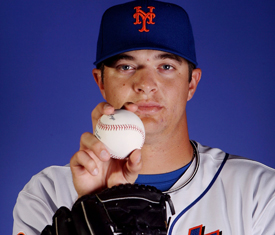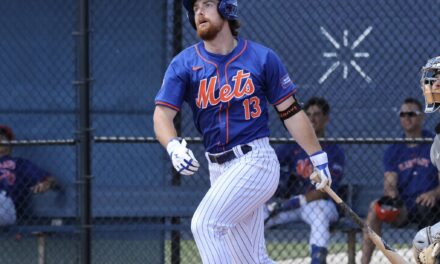
When the Mets drafted RHP Brant Rustich in the second round of the 2007 MLB Amateur Draft, many thought with his size, strength, stuff, and advanced skills, that he would move quickly through the minor leagues and be ready to help out in the big league bullpen sooner rather than later. Many Mets fans began to dream of this 6’6″ hard throwing, relief ace coming out of the Mets bullpen to strike fear into the hearts of opposing hitters, but so far it has not turned out that way.
Now, more than four years later, at age 26, Rustich has thrown less than 135 total professional innings due to what seemed to be, never-ending arm issues. But after enduring some very tough times, including a misdiagnosis on his arm, the problem was finally discovered and treated, and according to Brant, he is a healthy pitcher for the first time in years. Let’s find out a little more about what Rustich has gone through and what his prognosis is moving forward. And what better way to find out, than right from the horses’ mouth:
Petey: We are chatting today with NY Mets pitching prospect Brant Rustich. Hi Brant, thanks for taking a little time out to talk to us at MetsMerizedOnline.com. I hope you had a nice Thanksgiving holiday, now let’s get down to business. When the Mets drafted you out of UCLA in the 2nd round of the 2007 MLB Draft, how did you first hear about it, and what was that feeling like? Did you have any idea the Mets were interested in you?
Brant: When I was drafted I first heard from my agent Marc Agar right before our team practice. I was extremely excited and somewhat relieved. I knew the Mets were very interested in me before the draft. I had sat down at numerous dinners with my area scout and advance scouts with the Mets prior to the draft.
Petey: Is there one person, a coach, a friend or family member, or even another player, who you learned the most from, or who inspired you to chase your dream of becoming a major league baseball player?
Brant: I would say the main person I go to for baseball advice has always been my father. He knows me better than anyone else and has coached me my entire life. Sometimes it’s the simple advice that makes the difference for me. I think what has got me this far has simply been my competitiveness and confidence and that is something that was always big in my family. My father always told it to me straight, and never sugar coated anything in my athletics, or career. I think him always being honest with me, has let me not be content or settled with where I was in my career. As a coach, my father always had confidence in me, and that’s something that has been with me my entire career.
Petey: When you first signed a contract with the Mets, you were just getting over a finger injury sustained when you were still in college. But as you began to settle into your professional career, arm problems seemed to undermine your efforts and prevented you from pitching regularly. It seemed that every time you were about to turn a corner, the arm problems would crop up and put you back on the shelf. That must have been extremely frustrating for you. You pitched sparingly in 2007, logged 49.2 IP in 2008, 47.2 in 2009, and only 14.2 IP in 2010. Then 2011 was a lost season for you as you had to undergo surgery, and were rehabbing all season. What was the problem with your arm? What did they have to do to fix it, and how does it feel now?
Brant: The problem was thoracic outlet syndrome (TOS). My nerves and artery were compressed in my thoracic outlet just before my shoulder. To fix the problem they remove the upper rib and a scalene (neck) muscle to decompress the brachial plexus (nerve bundle) and the main artery. The problem was something that wasn’t acute, but something that had developed since adolescence. Over time, I had made adjustments in my pitching because of the lack of nerve function and sensation in my hand, as well as circulation. It was something that regressed slowly overtime that I didn’t even notice what I was really doing to compensate. One was gripping the ball tighter, because I couldn’t feel the laces. In doing so, it lead to the rupture of my tendon in my middle finger in college and numerous blister injuries in the humidity in Florida as a starter with the Mets. Once I became a Met, my finger finally recovered, however the fiery, nerve aching pain in my right arm only got worse and worse. The original diagnosis was a bone problem, which ended up being a misdiagnosis. It’s great that the problem was finally found and fixed, and I’m blessed the Mets have been patient with my progress.
Petey: Here’s to putting all that behind you, Brant, so you can get out there and take care of business on the field next year. Coming out of college you were regarded as an advanced college pitcher, with major league caliber stuff. We have heard that you throw several quality pitches, and that you throw very hard, but could you tell us a little more about your arsenal? What pitches you throw, and at what speeds?
Brant: Well the main pitches I throw are a fastball, slider, and change-up. In high school and college my best pitch was probably my 2 seam fastball (sinker) that seemed to leave me once I started developing worse arm problems and lack of sensation. I suppose the lack of feel for the baseball has probably made me the pitcher I am today. I never aimed the ball, I was forced to have to throw the ball with the most conviction as I could, to throw strikes. This made me a very aggressive pitcher, especially with my fastball and slider. I can say when semi-healthy, I throw in the mid 90’s with my fastball and my slider is probably mid to upper 80s. Change-up is probably 8-10 mph slower than my fastball, but typically with some sink.
Petey: What would you have to do in 2012 to consider it a very successful season for you? Do you have any goals for the upcoming year?
Brant: It’s pretty simple for me. If I’m pitching this year it’s because I feel I’m going to pitch in the big leagues. If I feel like my arm can’t withstand the rigors of a big league season, I’ll go home and get another day job. However, I have a ton of confidence that I am making progress and getting better. The fact is in 2007 I almost got a call up and I wasn’t even close to my potential in my opinion because I was already battling lack of feeling, and slight arm problems then. If I’m pitching on a full season team this year, I would bet that I pitch in the big leagues someday. That’s just how I feel. I’m coming out this year as a player, not as a rehab player. I’m done with rehab, so I’m going out to spring training with the mindset on pitching, and pitching well. There is nothing wrong with me anymore, the problem has been fixed. It’s my job to go pitch the best I can and turn some heads.
Petey: That’s a terrific attitude Brant, and all of us Met fans are pulling for you, believe me. What kind of things are you doing to stay in shape until the baseball season arrives? Can you describe your regimen? Did the Mets give you anything specific to work on before you report for ST?
Brant: I’m currently going to therapy and working on some nerve endurance exercises, which consist of fatiguing my body and my arm, then doing fine motor exercises with my hand to continue to build nerve strength and endurance in my arm. I also do shoulder, scapular, and core exercises 3 times a week. This is on top of the Mets strength and conditioning program that the strength coaches give to us every off season. I’m doing more field training this year, than probably ever before. This simply just means putting on cleats and running on the baseball field, rather than doing so much gym stuff. I’m working on my flexibility and health.
Petey: Do you have any preference between starting and relieving? Have the Mets indicated what their immediate plans were for you? I would think they’ll start you at A ball in St. Lucie until the weather warms up a bit and then you will most likely be headed for AA Bingo. Does that sound reasonable? From there it is just a stone’s throw to Citifield, and a major league debut for you. God willing, and with a little luck, you should make it there sometime in the near future, perhaps even this year. How does it feel to be getting closer and closer to The Show, with each passing day?
Brant: I’m sure the Mets aren’t thinking about anything other than my health. They just want to see me pitching on a mound. The rest will all fall into place. The fact is even if I’m healthy, I need to pitch well and throw strikes with good stuff. Nothing changes just because I feel well, it’s still a challenging game. I’m sure with my health history it will probably keep me in the bullpen which is fine. I just want to pitch. If I’m healthy I imagine I’ll move quickly, I’ve pitched pretty darn good most of my career unhealthy.
Petey: On a personal note, I hear you are getting married Brant, congratulations. When are you going to be tying the knot?
Brant: We are planning on getting married next fall. We have been together for over 5 years, and I’m so thankful to have her support during all my struggles in my career. I owe her a lot, and I look forward to spending the rest of my life with her.
Petey: That’s awesome. What was your favorite baseball team growing up? Your favorite player? Is there a major leaguer, past or present who you think you are similar to in pitching style?
Brant: My favorite team growing up was the San Diego Padres. My favorite players were probably Ken Griffey Jr. and Tony Gwynn. I really don’t know what pitcher has my style, I like to think I have my own style.
Petey: Very cool. And to finish up Brant, just a little personal info, not pertaining to baseball. What is your favorite movie? Favorite musician or band? Favorite food?
Brant: My favorite movie is probably “Shawshank Redemption”. Favorite musician is probably George Strait or Garth Brooks. Favorite food is Mexican food, without a doubt.
Petey: Oh yeah good choice, Shawshank is one of my faves too! Thanks again Brant, I really enjoyed doing this interview with you, and thanks again for taking time out to answer some questions, the reader’s at MMO will love it! Take care, have a great holiday season, and we’re looking forward to seeing you healthy and on the “bump” for a full season next year!
Wow what a fascinating interview by Brant! The fact that he has been through so much adversity already in his career, and yet continues to fight and work hard, is quite inspirational. He’s really quite a guy and has a fantastic attitude about who he is and where he is going. You can’t help but pull for a guy like this, especially when you consider his talent and ability. With luck, Rustich will be able to enjoy this coming season immensely, by pitching pain free and often, and striking fear into the hearts of opposing hitters.














